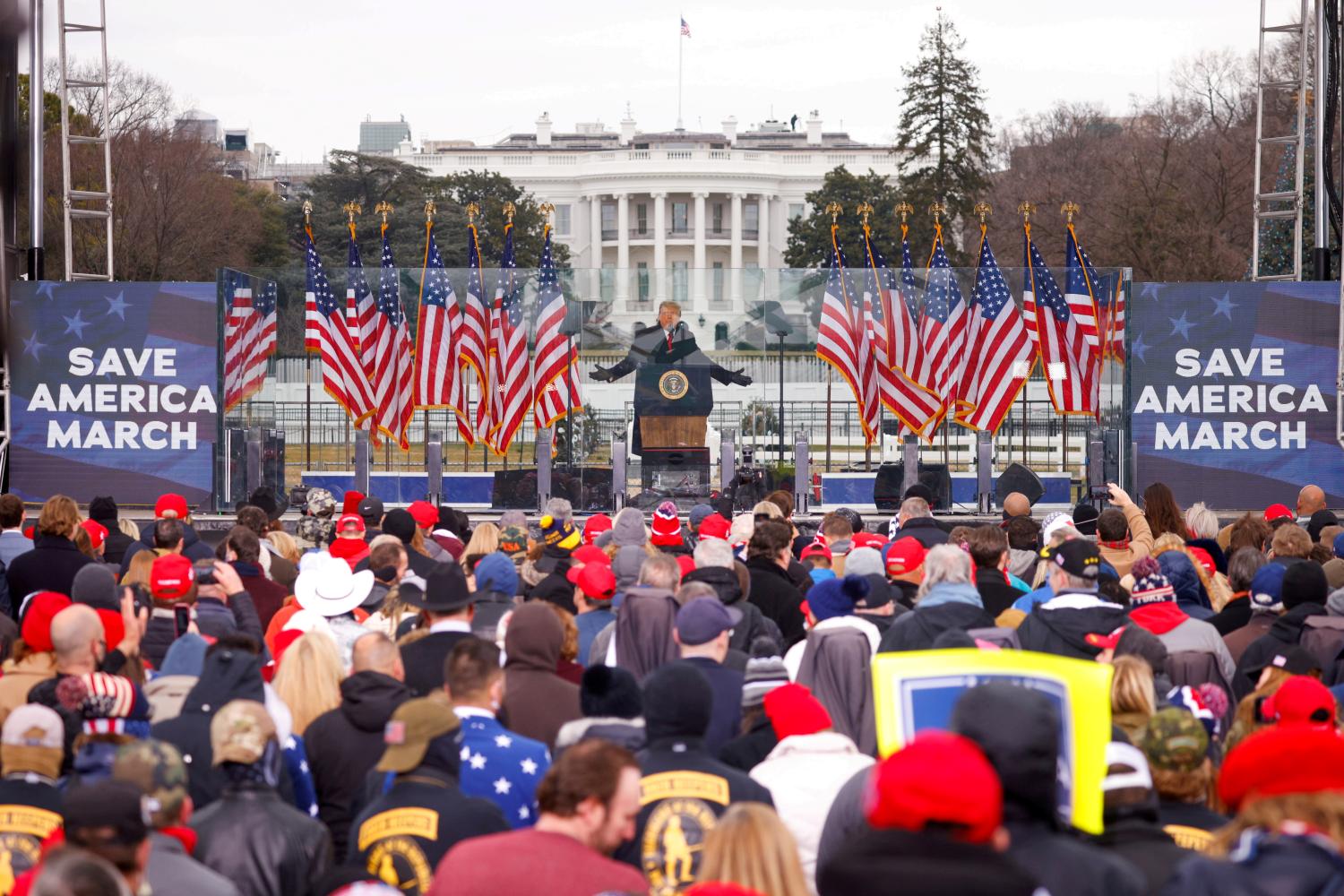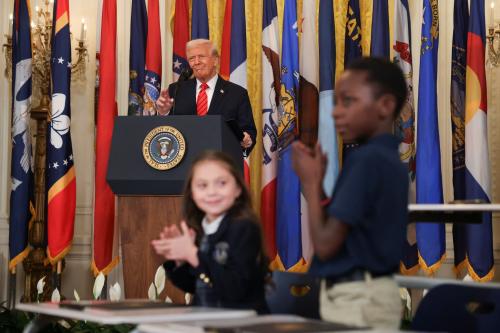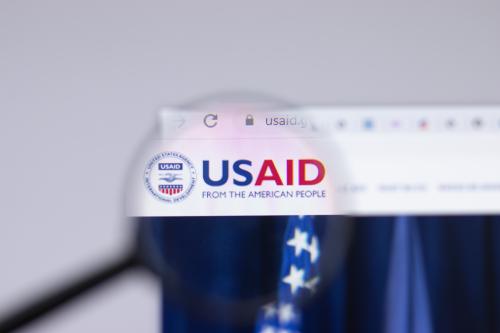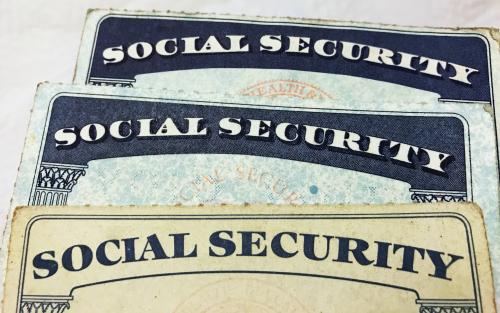The following text is the executive summary of “Fulton County, Georgia’s Trump Investigation: An Analysis of the Reported Facts and Applicable Law.” Download and read the full PDF of the report here.
On Saturday, January 2, 2021, at around 3:00 p.m., former President Donald J. Trump placed a call to Georgia’s Republican Secretary of State Brad Raffensperger. Throughout the roughly hour-long call, the former president repeatedly insisted that he had won the state of Georgia “by hundreds of thousands of votes.”1 As purported evidence, Trump cited “rally size” and “political people” who he said assured him that “there’s no way they [the Biden campaign] beat me.”2 He cycled through a list of conspiracy theories to explain his loss, covering “3,000 pounds” of shredded ballots; drop boxes “being delivered and delivered late”; a particular “professional vote scammer and hustler” who Trump claimed destroyed no fewer than 18,000 of his votes; and “the other thing, dead people.”3 At one point, when Raffensperger responded to one of Trump’s false claims by cautioning him that “the problem you have with social media [is that]…people can say anything,” Trump answered: “Oh, this isn’t social media. This is Trump media.”4
But Trump did more than merely complain about the election and catalog disinformation. He urged, and ultimately threatened, Raffensperger to reverse the election outcome—culminating in a demand that Raffensperger “find 11,780 votes” that could be deemed fraudulent and tossed out.5 That number mattered to Trump for a single reason: It was exactly one more vote than the margin of Joe Biden’s 11,779-vote victory in the state.6 As Trump apparently saw it, if Raffensperger’s office complied with his request and identified 11,780 votes for disqualification, Trump would be named the winner of the state’s presidential election (and presumably could use that development to seek a broader unraveling of the certified election results in other states confirming his defeat).
The transcript and audio file were reported by The Washington Post the following day, garnering widespread attention across a nation already aware of Trump’s refusal to accept the certified election results and assent to a peaceful transition of power. But this was no mere transgression of norms alone. Georgia law was also implicated. Trump’s entreaties to Raffensperger on the January 2 call, along with other steps he took to reverse his Georgia election loss, have exposed him and others involved to potential criminal liability in Georgia. On February 8, 2021, Raffensperger’s office opened a probe into Trump’s efforts to overturn his loss in the state.7 Two days later, Fulton County District Attorney Fani Willis announced the launch of a criminal investigation into Trump’s conduct vis-à-vis the election.8 At issue was not just Trump’s January 2 call to Raffensperger. The former president had publicly pressured and personally contacted several other officials in Georgia—including the governor, the attorney general, and the secretary of state’s chief investigator—about the election and how they might assist him in flipping the state’s electoral votes over to him even after the results had been duly certified.9 As recently as September 25, 2021, Trump returned to Georgia, stated that he had asked Governor Kemp for a second “special election,” and unleashed a barrage of attacks on him, the secretary of state, and others for not doing Trump’s bidding.10In this report, we consider the relevant facts and context of Donald Trump’s push to overturn the 2020 election results in Georgia. We analyze the extent to which these actions make the former president vulnerable to state criminal liability. We also assess how Trump’s attorneys may defend his conduct in pre- and (if any) post-indictment proceedings, as well as in the court of public opinion.
We conclude that Trump’s post-election conduct in Georgia leaves him at substantial risk of possible state charges predicated on multiple crimes. These charges potentially include: criminal solicitation to commit election fraud; intentional interference with performance of election duties; conspiracy to commit election fraud; criminal solicitation; and state RICO violations. Our conclusion is based entirely on publicly available reporting and evidence, including the recording of Trump’s call to Raffensperger.11 Our view is anchored by a close reading of the relevant portions of Georgia’s legal code, an unpacking of the extant case law defining the stated crimes, and a searching examination of the main likely defenses. The latter pose some serious questions but (at least, based upon what is currently known of the facts) appear to be unavailing.
Our aim in writing this report is to bring the facts, the law, and the possible defenses together to provide a comprehensive and accessible overview of the investigation and the possible crimes on which it is predicated. Our hope is that such an exercise offers a clear picture to the public, officials, and the press of this possible avenue of accountability for Trump’s ongoing attempts to attack election processes and subvert American democracy. We undertake our analysis with the recognition that, as of September 2021, DA Willis’s investigation is ongoing.12 The district attorney will ultimately bear the burden to prove any charges beyond a reasonable doubt using credible evidence in a court of law, and that high hurdle is a paramount consideration in determining whether Fulton County will bring charges at all. It is impossible to know whether, or (if so) when, criminal charges may eventually be brought in Georgia against the former president. We make no prediction in that regard, only a current assessment of the risk. Trump is innocent until proven guilty, and if charged, will have the opportunity to present the defenses like those we describe below. If past behavior is indicative of his response to future allegations, Trump will undoubtedly vigorously defend himself.
As a threshold matter, we note the deference that is due under principles of federalism to the state of Georgia in investigating and, if appropriate, prosecuting any transgressions of its own state law. In our federal system, governmental powers are divided between the national and the state governments. States have both the primary responsibility and authority to make determinations about matters within their purview.13 Those principles apply with full force here: Trump’s communications with state officials potentially violated state criminal laws on matters of immense state interest. While Trump was president at the time he sought to interfere with the election in Georgia, our constitutional scheme (and its protection of federal interests) poses no barrier to the vindication of Georgia’s interests in enforcing its criminal code.14 Following settled Supreme Court precedent (including the recent case of Trump v. Vance15), Georgia state prosecutors certainly have the power to investigate and charge a former president for willfully reaching into their jurisdiction to allegedly transgress their laws and interfere with their officials on a matter of utmost state interest: the administration of Georgia’s election procedures. If it were otherwise, then states would lack authority to enforce important election integrity laws against perhaps the most significant potential violators: the candidates themselves.
-
Footnotes
- Amy Gardner & Paulina Firozi, Here’s the full transcript and audio of the call between Trump and Raffensperger, The Washington Post (Jan. 15, 2021, 1:15 PM), https://www.washingtonpost.com/politics/trump-raffensperger-call-transcript-georgia-vote/2021/01/03/2768e0cc-4ddd-11eb-83e3-322644d82356_story.html.
- Id.
- Id.
- Id.
- Id.
- Georgia Presidential Election Results 2020, NBC News (March 6, 2021, 10:11 PM), https://www.nbcnews.com/politics/2020-elections/georgia-president-results.
- Linda So, Georgia Secretary of State’s office launches probe into Trump’s election phone call, Reuters (Feb. 8, 2021, 5:06 PM), https://www.reuters.com/article/us-usa-trump-georgia-investigation-exclu/georgia-secretary-of-states-office-launches-probe-into-trumps-election-phone-call-idUSKBN2A82HO.
- Richard Fausset & Danny Hakim, Georgia Prosecutors Open Criminal Inquiry Into Trump’s Efforts to Subvert Election, The New York Times (Feb. 10, 2021), https://www.nytimes.com/2021/02/10/us/politics/trump-georgia-investigation.html.
- Id.
- Donald Trump, Perry, Georgia Rally Speech Transcript September 25, REV (Sept. 26, 2021), https://www.rev.com/blog/transcripts/donald-trump-perry-georgia-rally-speech-transcript-september-25.
- Gardner & Firozi, supra note 1.
- Sara Murray & Jason Morris, Georgia criminal probe into Trump’s attempts to overturn 2020 election quietly moves forward, CNN (Sept. 17, 2021, 1:50 PM), https://www.cnn.com/2021/09/17/politics/georgia-probe-trump-election/index.html; Jose Pagliery & Asawin Suebsaeng, Georgia DA Interviews Witnesses About Trump’s Call to ‘Find’ Votes, The Daily Beast (Sept. 5, 2021, 8:55 AM), https://www.thedailybeast.com/georgia-district-attorney-investigates-donald-trumps-call-to-find-votes.
- Comparing Federal & State Courts, United States Courts, https://www.uscourts.gov/about-federal-courts/court-role-and-structure/comparing-federal-state-courts.
- National Center for State Courts, Georgia, Court Statistics Project, https://www.courtstatistics.org/state_court_structure_charts/georgia.
- Trump v. Vance, 140 S. Ct. 2412 (2020).
The Brookings Institution is committed to quality, independence, and impact.
We are supported by a diverse array of funders. In line with our values and policies, each Brookings publication represents the sole views of its author(s).










